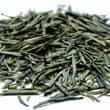Background
- Theanine is an amino acid found naturally in tea. Besides caffeine, theanine has been identified as a major component of tea. While younger and fresher tea leaves tend to be richer in caffeine, older leaves tend to have higher theanine levels; furthermore, the withering process of tea production also increases theanine content.
- Some evidence suggests that theanine affects mental performance and reduces blood pressure. Research has examined the cognitive effects of this substance alone and when combined with caffeine.
References
- Bryan J. Psychological effects of dietary components of tea: caffeine and L-theanine. Nutr Rev 2008;66(2):82-90. View Abstract
- Cooper R, Morre DJ, Morre DM. Medicinal benefits of green tea: Part I. Review of noncancer health benefits. J Altern Complement Med 2005;11(3):521-528. View Abstract
- Dimpfel W, Kler A, Kriesl E, et al. Source density analysis of the human EEG after ingestion of a drink containing decaffeinated extract of green tea enriched with L-theanine and theogallin. Nutr Neurosci 2007;10(3-4):169-180. View Abstract
- Friedman M, Mackey BE, Kim HJ, et al. Structure-activity relationships of tea compounds against human cancer cells. J Agric Food Chem 2007;55(2):243-253. View Abstract
- Gomez-Ramirez M, Higgins BA, Rycroft JA, et al. The deployment of intersensory selective attention: a high-density electrical mapping study of the effects of theanine. Clin Neuropharmacol 2007;30(1):25-38. View Abstract
- Haskell CF, Kennedy DO, Milne AL, et al. The effects of L-theanine, caffeine and their combination on cognition and mood. Biol Psychol 2008;77(2):113-122. View Abstract
- Kakuda T. Neuroprotective effects of the green tea components theanine and catechins. Biol Pharm Bull 2002;25(12):1513-1518. View Abstract
- Kimura K, Ozeki M, Juneja LR, et al. L-Theanine reduces psychological and physiological stress responses. Biol Psychol 2007;74(1):39-45. View Abstract
- Lu K, Gray MA, Oliver C, et al. The acute effects of L-theanine in comparison with alprazolam on anticipatory anxiety in humans. Hum Psychopharmacol 2004;19(7):457-465. View Abstract
- Nathan PJ, Lu K, Gray M, et al. The neuropharmacology of L-theanine(N-ethyl-L-glutamine): a possible neuroprotective and cognitive enhancing agent. J Herb Pharmacother 2006;6(2):21-30. View Abstract
- Netsch MI, Gutmann H, Luescher S, et al. Inhibitory activity of a green tea extract and some of its constituents on multidrug resistance-associated protein 2 functionality. Planta Med 2005;71(2):135-141. View Abstract
- Nobre AC, Rao A, Owen GN . L-theanine, a natural constituent in tea, and its effect on mental state. Asia Pac J Clin Nutr 2008;17 Suppl 1:167-168. View Abstract
- Rogers PJ, Smith JE, Heatherley SV, et al. Time for tea: mood, blood pressure and cognitive performance effects of caffeine and theanine administered alone and together. Psychopharmacology (Berl) 2008;195(4):569-577. View Abstract
- Sugiyama T, Sadzuka Y. Theanine and glutamate transporter inhibitors enhance the antitumor efficacy of chemotherapeutic agents. Biochim.Biophys.Acta 12-5-2003;1653(2):47-59. View Abstract
- Yamada T, Terashima T, Okubo T, et al. Effects of theanine, r-glutamylethylamide, on neurotransmitter release and its relationship with glutamic acid neurotransmission. Nutr Neurosci 2005;8(4):219-226. View Abstract







